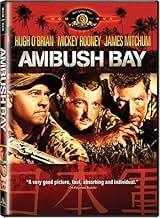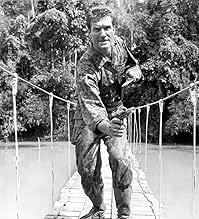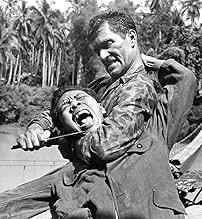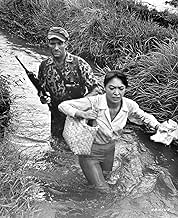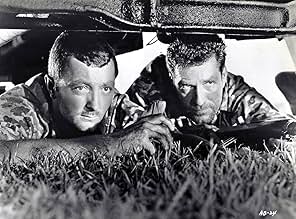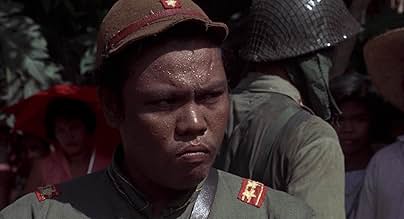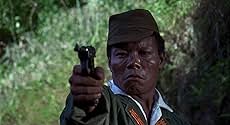Marines have 96 hours to search a Japanese-held island for a spy with vital information.Marines have 96 hours to search a Japanese-held island for a spy with vital information.Marines have 96 hours to search a Japanese-held island for a spy with vital information.
Peter Masterson
- Sgt. William Maccone
- (as Pete Masterson)
- Director
- Writers
- All cast & crew
- Production, box office & more at IMDbPro
Featured reviews
I saw this on a crappy B&W TV in 1969 or so at around the age of 8. It always stuck in my head as my favorite war movie as a child. I lived in the middle of the city, San Diego, but there were miles of wooded canyons directly behind my house, and in the 60's we all played soldier. It was always WWII, even though it was the middle of the Vietnam war. In watching this for the first time in over 50 years, I know why I liked it as a kid. It has the exact feel of me and my friends running around the bushes in the canyons playing war. I have always remembered the Mickey Rooney grenade/potato scene. Has not come up yet as I type this, but has always been imprinted in my brain. I am surprised how this is all filmed on location, and not in a studio where it could have looked like Gilligan's Island. Seeing it on widescreen and in color gives away some of the shear stupidity of this movie, like the red hat. But hey, for a kid watching on an old TV 50 plus years ago, it is one of the great WWII movies ever made.
For standards of movie making decades later, the movie has its flaws but if you look past that, the plot is good and so is the acting. I enjoyed the nostalgia look at war movies where it was made close / somewhat close to when it happened and present day mannerisms, colloquial expressions and revisionist haven't taken too much of a overriding theme.
The actors in this movie are thin which to me reflects what a true soldier living on rations would look like, they don't use foul language in every sentence nor do they talk about sex. The plot shows Americans with dedication to duty, callous to the death around them and respect for each other except for the character, Pfc James Grenier, played by James Mitchum. As you watch the movie you go from disliking Grenier to rooting for him as all of the members of the mission are killed off.
The actors in this movie are thin which to me reflects what a true soldier living on rations would look like, they don't use foul language in every sentence nor do they talk about sex. The plot shows Americans with dedication to duty, callous to the death around them and respect for each other except for the character, Pfc James Grenier, played by James Mitchum. As you watch the movie you go from disliking Grenier to rooting for him as all of the members of the mission are killed off.
This is one of those modest films about life in the Marine corps during War time. Directed by Ron Winston, it's depiction is that of a select group of specialized soldiers, sent on a top secret mission to destroy a specific target which threaten the U.S. Navy's amphibious assault. The movie stars tough guy Hugh O'Brian as 1st Sgt. Steve Corey. Mickey Rooney follows as Gunnery Sgt. Ernest Wartell, as an equally tough as nails non-com who is convincing as a career soldier. James Mitchum is interesting, though irritatingly naive as Pfc. James Grenier who joins the elite group at the last minute. Their mission is dangerous, indeed nearly impossible as they are required to land on a heavily guarded island held by the Japanese, traverse a dense jungle and to destroy their radar station controlling a hidden underwater mine field awaiting the unsuspecting Americans. Despite the minor flaws in the film, the acting is top notch and the drama is consistent with true war like Military action. The movie is easily recommended to war buffs and fans of the main stars. ****
The criteria presented regarding this movie is correct, except for the comment on the US M4 Sherman. In all wars, including the Second World War, forces from all sides wind up capturing enemy equipment. M3A1 Stuart light tanks of US manufacture were caputred by the Japanese in the Philippines (in Bataan) during 1941 and subsequently pressed into their service. The tank depicted in the movie could have been captured during the Guadalcanal campaign as the island kept continuously changing hands, shipped to the Phillipines and assigned to serve whatever division occupied those islands. Simple as that. There are records that show a few Sherman tanks were INDEED captured during the entire Pacific War.
Ambush Bay is not a bad little WW2 "B"movie auctioneer. It blends your standard Pacific theatre war movie, with the old horror trope of our heroes being knocked off one by one letting us wonder who might survive if any at all. Unfortunately that concept is pretty much immediately undermined by the director choosing to use an unneeded narration, which should give the alert viewer a strong hint as to the final outcome. Ambush Bay is full of little positives and negatives, such as this.
It was filmed entirely on location in The Philippines, where the story is set, which is definitely a bonus for a clearly low budget feature. But then there is quite a bit of not particularly well-lit night-time cinematography in the jungle, during which it's pretty difficult to clearly see what action is occurring.
The story involves an elite unit of American marines undertaking a secret mission (Is there any other type?) to a Japanese - held island. They are to make contact with an American spy with vital information which may well affect the result of the war in the Pacific. The trouble is the spy works in a Japanese "tea-house" (pleasure resort for soldiers) and the Americans have no clue to the spy's identity, except a code-name. And beginning with their landing on the island they begin to suffer casualties.
Most associated with the movie had television pedigrees: director Ron Winston, (This was his debut cinema release.) lead, Hugh O"Brian and many of the support cast, including James Mitchum (Yes, Robert's son! The physical resemblance is there, but that's where it ends. Where Dad made acting look easy, Junior makes it look trying.) The arguable exception is Mickey Rooney, who whilst putting in a welcome appearance, is the least likely physical specimen one might expect to see on a mission such as this.
We get very little characterisation in Ambush Bay. Many of the soldiers are killed off, before we even know their names, some it has to be said, in rather silly fashions, for supposedly elite combat troops. Speaking of fashions, I'm not sure why some of them seemed to be wearing baseball caps. It never seemed to be explained. Mitchum's is the most developed character, playing a duck out of water. Drafted into the mission involuntarily because of his radio communication skills, he completes the old trope of a rookie soldier thrown into a situation beyond his control.
Ambush Bay doesn't aim high (even that title??) but what it does do, it does OK. There is plenty of action (some of it, literally unbelievable), a fair degree of suspense and I have to say, that I have seen far worse in terms of entertainment value.
It was filmed entirely on location in The Philippines, where the story is set, which is definitely a bonus for a clearly low budget feature. But then there is quite a bit of not particularly well-lit night-time cinematography in the jungle, during which it's pretty difficult to clearly see what action is occurring.
The story involves an elite unit of American marines undertaking a secret mission (Is there any other type?) to a Japanese - held island. They are to make contact with an American spy with vital information which may well affect the result of the war in the Pacific. The trouble is the spy works in a Japanese "tea-house" (pleasure resort for soldiers) and the Americans have no clue to the spy's identity, except a code-name. And beginning with their landing on the island they begin to suffer casualties.
Most associated with the movie had television pedigrees: director Ron Winston, (This was his debut cinema release.) lead, Hugh O"Brian and many of the support cast, including James Mitchum (Yes, Robert's son! The physical resemblance is there, but that's where it ends. Where Dad made acting look easy, Junior makes it look trying.) The arguable exception is Mickey Rooney, who whilst putting in a welcome appearance, is the least likely physical specimen one might expect to see on a mission such as this.
We get very little characterisation in Ambush Bay. Many of the soldiers are killed off, before we even know their names, some it has to be said, in rather silly fashions, for supposedly elite combat troops. Speaking of fashions, I'm not sure why some of them seemed to be wearing baseball caps. It never seemed to be explained. Mitchum's is the most developed character, playing a duck out of water. Drafted into the mission involuntarily because of his radio communication skills, he completes the old trope of a rookie soldier thrown into a situation beyond his control.
Ambush Bay doesn't aim high (even that title??) but what it does do, it does OK. There is plenty of action (some of it, literally unbelievable), a fair degree of suspense and I have to say, that I have seen far worse in terms of entertainment value.
Did you know
- TriviaMickey Rooney became ill with a fever during filming. During his hospital stay in Manila, his wife Carolyn Mitchell was killed by her lover in a murder-suicide.
- GoofsThe camouflage uniforms worn by the American raiders are not WWII military camouflage uniforms. They are wearing commercial duck hunter suits that were sold in the USA after World War II. They are based on wartime USMC camouflage uniforms and bear a passing resemblance.
- Quotes
Soldier: How many men, your soldiers?
Sgt. Ernest Wartell: Including the European theater, I'd say about six million.
- Crazy creditsOpening credits prologue: THE PHILIPPINES OCTOBER 1944
- ConnectionsReferenced in Lusting Hours (1967)
- How long is Ambush Bay?Powered by Alexa
Details
- Runtime
- 1h 49m(109 min)
- Aspect ratio
- 1.37 : 1
Contribute to this page
Suggest an edit or add missing content


